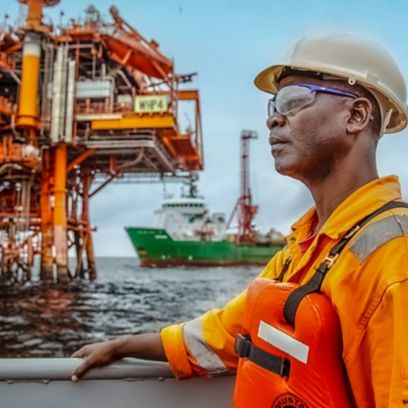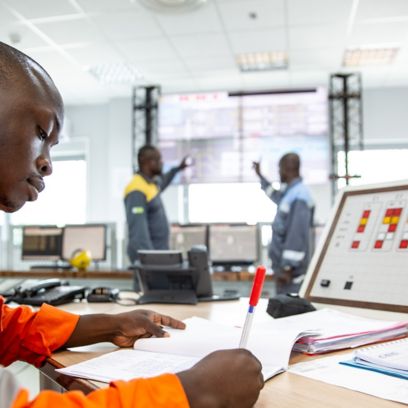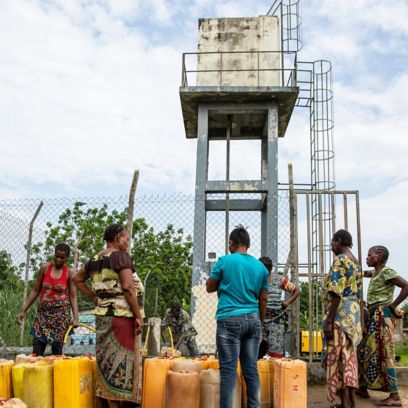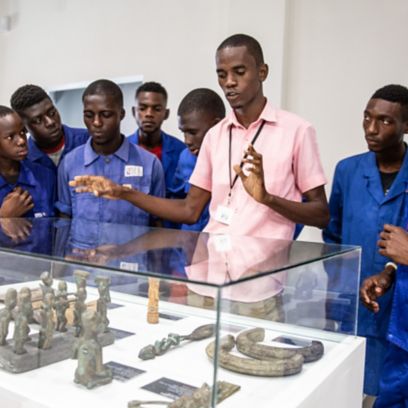Type of activity
Bioenergy
Chemistry
Liquid natural gas (LNG)
Oil & Gas
Access to water and sanitation
Access to energy
Economic diversification
Education
Community health
Territory protection

We operate in the exploration, development and production of hydrocarbons in the Republic of Congo, where we are focussed on increasing the production of gas, both associated and non-associated, for domestic and export markets, with the Congo LNG project, currently in its production phase, and we are developing the Marine XII project. We are involved in various initiatives that support the energy transition and the decarbonisation of transport, such as the creation of an agri-hub specialised in the production of vegetable oil for Enilive’s biorefineries. The initiative also has a positive impact on local development, as it allows farmers to earn additional income from land cultivation carried out on degraded land that does not compete with food crops. We are also present in the country in the chemical sector.
Activity start date: 1968 – present
Our exploration activities are focused on the conventional and deep offshore areas off the coast of Pointe-Noire and in the onshore area of Koilou. To develop and market the country’s gas resources, we have made major investments in two floating liquefied natural gas (LNG) plants. As part of the Congo LNG project, the Tango floating liquefied natural gas (FLNG) unit is in production and is joined by Nguya FLNG and the Scarabeo floating production unit (FPU). These plants will allow us to produce electricity for the domestic market and export LNG to Europe.
The first agri-hub established in the country by Eni is located in the Loudima district. The agricultural products sent to the hub are used to produce vegetable oil to be converted into biofuel in the Enilive biorefineries. The agri-hub also valorises industrial by-products, turning them into animal feed and fertilisers for the local market, with a focus on the circular economy. To support the mechanisation of the sector in the country, the project includes the supply of several agricultural machines, such as tractors and threshers. The programme has a significant impact on employment through the jobs created at the agri-hub and the positive impact on the local supply chain. We also guarantee farmers access to the market by purchasing the crops intended for vegetable oil extraction, ensuring their collection and transportation to the agri-hub. Finally, through Joule, Eni’s business school, a programme has been launched to accelerate the development of local startups in the agricultural sector, providing concrete support to entrepreneurs.
Eni is committed to cultivating feedstocks for biofuels exclusively on degraded or abandoned land that has lain unused, identified in coordination with local authorities, and with no impact on existing food crops. This approach, based on the principle of additionality, ensures that only biomass derived from new and additional agricultural production is used, preventing indirect land use changes and negative impacts on current food production. Eni’s initiatives aim to revitalise agriculture on these lands by adopting regenerative practices, crop rotation, and promoting mechanisation, positively contributing to the local economy and food security through by-products such as pressed cakes used for animal feed.
We support the local communities in strengthening their skills in agriculture and entrepreneurship with the Hinda Integrated Project. The development of a project for the distribution of improved cookstoves, launched in collaboration with the non-governmental organisation Femmes Énergies and the AVSI Foundation, will simultaneously replace traditional biomass devices, significantly reducing the impact on forest resources, with additional health benefits while cooking. The distribution of the devices is underway, alongside the development of a project promoting local production, thus encouraging Congolese entrepreneurship. Other projects are also underway for access to drinking water, improved health services, and primary education in several villages. We promote access to education through the Alpha Hinda project and access to energy by building power plants and upgrading electricity transmission infrastructure. We also promote culture among the population. Thanks to the Yasika program, the initiative promoted by Joule, Eni’s school for entrepreneurship, dedicated to startups and young entrepreneurs, we foster the creation of innovative local businesses in the fields of environmental protection, sustainable agricultural production, and the development of technologies designed to minimize ecological impact. Finally, with the Eni Foundation, we have initiated two projects focused on disease care and prevention, with a special focus on vulnerable families.
From petroleum products to biofuels, we share the country’s path towards the energy transition.
The first Phase 2 LNG cargo has been announced, just 35 months after construction of the Nguya FLNG unit began.
Phase 2 has come on stream ahead of the project schedule, marking a significant international milestone in the LNG sector.
Once it enters production in the Marine XII concession, the floating unit will significantly increase the total liquefaction capacity of the Congo LNG project.
The centre, located in the southern part of the country, will produce vegetable oil to be processed into biofuel at the Enilive biorefineries.
The hull of Nguya FLNG, the second floating natural gas liquefaction unit to join the already operational Tango FLNG, has been launched in China.
With this first shipment, the Republic of the Congo enters the group of LNG exporting countries, thereby contributing to its economic development and to global energy security.
Natural gas production from the offshore Congo LNG project begins, through the floating Tango FLNG plant.
An official ceremony marks the start of the project to build a second plant to produce liquefied natural gas.
The agreement provides for the construction and installation of a floating liquefied natural gas production unit.
The facility (Floating Liquefied Natural) will be used as part of the natural gas development project in the Marine XII block.
The agreement provides for the acceleration and increase of gas production in Congo, in addition to its export.
The memorandum of understanding marks the start of activities for the joint development of oil production for biorefining.
The field, located in the Marine XII block, started just sixteen months after the exploration discovery.
Through the company Eni Congo S.A., hydrocarbon exploration activities start.

The country's abundant natural gas resources contribute to security of supply and local growth.

A large offshore field with major exploration achievements, it is developing rapidly thanks to integration with existing infrastructure.

It is a large-scale integrated project aimed at improving the socio-economic conditions of local communities.

Focusing on education, health, access to water and agriculture for communities near the M'Boundi, Kouakouala, Zingali and Loufika fields.

From the opening of museums and art galleries to cultural centres, we are committed to promoting local heritage for the benefit of communities.
Visit the agri-feedstock projects that contribute to the increasingly sustainable supply of our biorefineries.
The interactive special